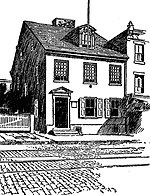Thones Kunders
This article includes a list of general references, but it lacks sufficient corresponding inline citations. (June 2020) |
Thones Dennis Kunders (c. 1654 – September 1729, Germantown, Philadelphia, Pennsylvania) was an early settler of colonial Pennsylvania.
Biography
[edit]


Kunders was born in Mönchengladbach[1], Holy Roman Empire, and was a citizen of Krefeld. A dyer by trade, he was the head of one of the first 13 German families who sailed aboard the ship Concord to arrive in Philadelphia, Pennsylvania, on 6 October 1683, beginning the German immigration to America. Kunders later called himself Anthony Conrads and still later Cunard, and was also called Dennis Conrad. At Kunders's house in Germantown were held the first German religious services in America, attended by both Mennonites and Quakers, including Pennsylvania proprietor William Penn.
On February 18, 1688, the first protest against slavery in the New World was drafted in Kunders's house. The protest, written by Francis Daniel Pastorius and signed also by Garrett Henrich, Abraham Up den Graef, and Derick Up de graeff, opposed the importation, sale, and ownership of slaves.[2][3]
When Germantown was granted a charter by Penn in 1689, Kunders was appointed one of the first burgesses.
Today, a historical marker stands at the site of his Germantown house.
References
[edit]- ^ Genealogies of Pennsylvania Families from the Pennsylvania Genealogical Magazine. Volume III: Stauffer-Zerbe. Baltimore: Genealogical Publishing Co., Inc. 1982. p. 508.
- ^ "Quaker Protest Against Slavery in the New World". Bryn Mawr College Digital Collections.
- ^ "Historic Germantown". www.ushistory.org. Retrieved 2024-03-05.
- Global Anabaptist Mennonite Encyclopedia Online
- Thones Kunders House Site at USHistory.org
- The Pennsylvania Magazine of History and Biography, Historical Society of Pennsylvania, v. 4, 1880
